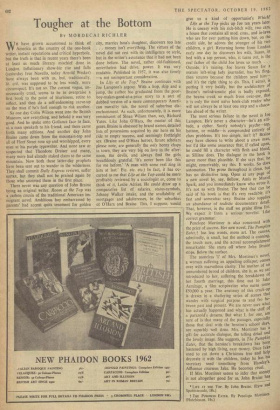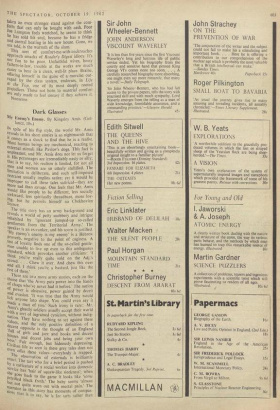Tougher at the Bottom
BY MORDECAI
RICHLER
E have grown accustomed to think of
America as the country of the one-book writer, instant reputations and critical hyperbole, but the truth is that in recent years there's been at least as much literary mischief done in London. Inflationary show-biz rise and falls (yesterday Ivor Novello, today Arnold Wesker) have always been with us, but, traditionally, lit. crit. was supposed to be less windy, more circumspect. It's not so. The current vogue, un- necessarily cruel, seems to be to overpraise a first book to the point of blurbiness, retire to reflect, and then do a self-redeeming carve-up on the man if he's fool enough to risk another.
So one day Colin Wilson went into the British Museum, saw everything, and behold it was very good. And he spake unto Gollancz face to face, as a man speaketh to his friend; and there came forth many editions. And another day John Braine came down from the mountain-top and all of Fleet Street rose up and worshipped, every man at his purple typewriter. And none saw or suspected that Theodore Dreiser and many, many more had already staked claim to the same mountain. Now both these latter-day prophets have been sent out to wander in the wilderness. They shall commit Daily Express reviews, suffer surtax, but they shall not be praised again by those who anointed them in the first place.
There never was any question of John Braine being an original writer. Room at the Top was a carbon cousin of the traditional American im- migrant novel. Ambitious boy embarrassed by parents' bad accent quits tenement for golden
city, marries boss's daughter, discovers too late . . . money isn't everything. The virtues of the novel did not rest with its intelligence or style, but in the writer's assurance that it had not been done before. The novel, rather old-fashioned, nevertheless had drive, power. It was very readable. Published in 1957, it was also timely —a not unimportant consideration.
In Life at the Top,* Braine continues with Joe Lampton's argosy. With a hop, skip and a jump, the author has graduated from the poor- boy-makes-good-at-a-price story to a sort of dubbed version of a more contemporary Ameri- can morality talc, the novel of suburban dis- enchantment. As such, unfortunately, it is more reminiscent of Sloan Wilson than, say, Richard Yates. Like John O'Hara, the master of this genre, Braine is obsessed by brand names, detailed lists of possessions acquired by our hero on his ride to empty success, and seemingly forthright sex. (Braine and O'Hara heroes, future scholars please note, are generally the only horny chaps in town, they are very big on love in the after- noon, the devils, and always find the girls breathlessly grateful. 'It's never been like this for me before.' A man with some real zing in him at last.' Etc. etc. etc.) In fact, it has oc- curred to me that Life at the Top could be more profitably reviewed by a sociologist or, come to think of it, Leslie Adrian. He could draw up a comparative list of salaries, status-symbols, Johnny Walker intake, and the availability of mortgages and adulteresses, in the suburbias of O'Hara and Braine. This, I suppose, would give us a kind of opportunist's Which?
Life at the Top picks up Joe ten years later. He is uneasy with his rich-bitch wife, two cars, a house that contains all mod. cons., and in-laws who are for ever putting him down, but, on the credit side, he adores the younger of his two children, a girl. Returning home from London early one day he discovers his wife, Susan, in bed with a top person, who, it turns out, is the real father of the child Joe loves so much. . . • Outside, it's raining. Joe leaves Susan for a mature left-wing lady journalist, has his fling, then returns because the children need him— and it's the right thing to do. This, I admit, is putting it very baldly, but the architecture of Braine's melodramatic plot is badly exposed, the beams creak so much from over-use, that it is only the most naïve book-club reader who will not always be at least one step and a choco- late ahead of the writer.
The most serious failure in the novel is Joe Lampton. He's never a character—he's an atti- tude, a cipher. Surely nobody's psyche—top, bottom, or middle—is compounded entirely of class problems. It's too simple, isn't it? Braille may have chosen to write about a straw man, but I'd like some assurance that, if called upon, he could fill a character with flesh and blood, as Sillitoe does. The dialogue in the book is never more than plausible. If she says that, he might, conceivably, say this. It works. So does automation. The prose throughout is clean, but has no distinctive tang. Open at any page of a new novel by, say, Bellow, Amis or Muriel Spark, and you immediately know who wrote it. It's not so with Braine. The best that can be said of his book is that it's very readable, it's fast and somewhat sexy. Braine also supplies an abundance of realistic documentary detail. That, however, is the stuff we praise films for. We expect it from a serious novelist. Like correct grammar. Penelope Mortimer is also concerned with the price of success. Her new novel, The Pumpkin Eater,t has less words, more art. The canvas, admittedly, is small, but the method is cunning, the touch sure, and the actual accomplishment remarkable. She starts off where John Braine stops. Below the surface.
The nameless 'I' of Mrs. Mortimer's novel, a woman suffering an appalling collapse, comes over with marvellous clarity. The mother of an unnumbered brood of children, she is, as we are introduced to her, suffering the breakdown of her fourth marriage, this time out to Jake Armitage, a film scriptwriter who earns some £50,000 a year. The anatomy of this crack-uP is drawn in a shattering series of scenes that Wander with surgical purpose to and fro be- tween past and present. We are never sure what has actually happened and what is the stuff of
a paranoid's dreams. But what I, for one, am sure of is that many of the passages, especially
those that deal with the heroine's school days, are superbly well done. Mrs. Mortimer has a gift for accurate dialogue, the telling detail and
the lovely image. She suggests, in The Pumpkin Eater, that the heroine's breakdown has been hastened by high living, easy money. Once Jake
used to cut down a Christmas tree and help decorate it with the children, today he has his secretary send something from I4amley Affluence coarsens Jake. He becomes cruel.
If Mrs. Mortimer seems to infer that money is not altogether good for us, John Braine has • LIFE AT THE TOP. By John Braine_ (Eyre and Spottiswoode, 18s.) t THE PUMPKIN EATER. By Penelope Mortimer. (Hutchinson, 18s.) taken an even stronger stand against the com- forts that can only be bought with cash. Poor Joe Lampton feels wretched, he seems to think he has sold his soul, because he has a fridge and central heating in his new house. Gone, we are told, is the warmth of the slum. This sort of comfort-me-with-cockroaches approach smacks of Reader's Digest idiocy. It's not fun to be poor. Unfaithful wives, bossy fathers-in-law, trouble at the works are much easier to bear in a clean, well-lit place. Braine, offering himself in the guise of a- moralist out- raged by the class system, endorses, in Life at the Top, one of its most deeply rooted prejudices. Those not born to material comfort are only made to feel uneasy if they achieve it.
Nonsense.















































 Previous page
Previous page